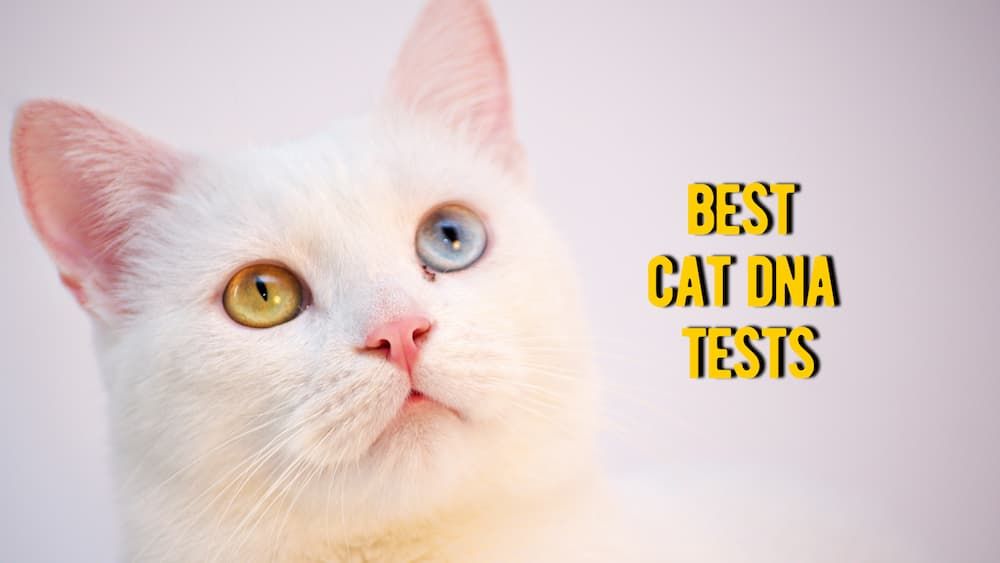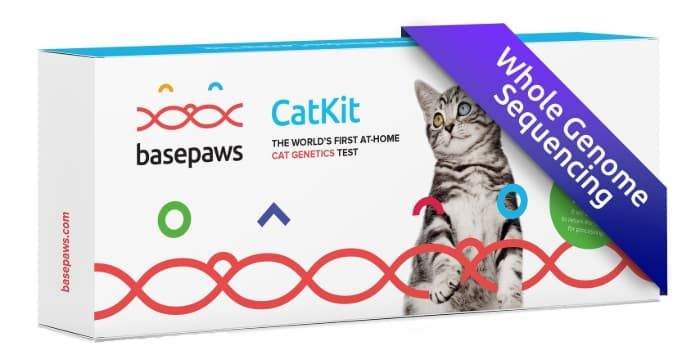The Best Cat DNA Tests: Cat Genetic Testing (Review)
Written by:
Author: Vicki Smirnova
Vicki Smirnova is a professional writer and editor who adores animals and helps readers get along well with their pets. She has been working in digital media for more than 5 years and has great experience writing content about lifestyle, including pets. Vicki specializes in dog health and nutrition, cat feeding, dog training. She is an aquarium lover and is passionate to write about fish care at home. Also, Vicki headed several websites and worked as a news editor.
View all 245 articlesLearn about our editorial process and veterinary review board.
Viewed: 238
Updated on: 01/24/2023
Determining your cat’s genetic profile allows you to identify the unique characteristics of a given cat. From detecting breed to preventing chronic disease, a DNA test is essential in making your pets healthier and happier.
Our the 4 Best Cat Breed Testing
Here is the best five options:
Products | Benefits | Links |
Our TOP Pick | 1. Basepaws Breed + Health DNA Test
| |
Most Complete DNA Test | 2. Basepaws Whole Genome DNA Test
| |
Best for Health | 3. ORIVET Cat DNA Test Kit
| |
Kidney Health Pick | 4. EasyDNA Feline PKD Testing Useful for breeders to exclude cats with PKD genes to produce healthy kittens in the future. |
*All ratings are formed by the article’s author based on own research and combined with customer reviews.
Cat DNA Test Kits Reviews
1. Basepaws Breed + Health DNA
Basepaws is a company that will help you learn more about your furry friend. Discover the unique features of your pet with the help of DNA tests from Basepaws.
Basepaws is a leader in the field of feline genetics. The organization’s genomic database is constantly expanding. Employees are constantly learning new information about breeds, characteristics, and health. Basepaws’ goal is to improve the lives of cats around the world.
DNA tests for cats are delivered free of charge within the continental United States. Delivery is about $15. The test itself takes about 4-6 weeks to analyze.
COUPON: Looking for a Basepaws coupon code? Take advantage and use THEPETS10 that gives $10 off.
Learn more about your pet with the help of a DNA for cats. This test will reveal the full owner’s information about the origin and breed of the pet. The test helps you uncover information about your pet’s health and develop a plan for its nutrition and care. For analysis, simply take a saliva swab sample and send it for testing. The results will be ready in 6-9 weeks. Discover new information about your furry friend with the Basepaws CatKit at-Home cat genetics test.
Key features:
- This is can help recognize more than 40 signs that cause 17 genetic diseases, including: polycystic kidney disease (PKD), hypertrophic cardiomyopathy (HCM), retinal degeneration, hypothyroidism.
- Will help you find out about the origin of your kitten.
- Helps you build an acceptable food and general care plan for your pet.
Pros
Cons
- The results include extensive information about your pet’s genetics.
- Easy-to-use kit.
- Results in 6-9 weeks.
- Expensive international delivery
2. Basepaws Whole Genome DNA Test
COUPON: Looking for a Basepaws coupon code? Take advantage and use THEPETS10 that gives $10 off.
Basepaws genome sequencing (WGS) is the most complete method of DNA analysis. Conducting research based on this test will reveal the most comprehensive information to the pet owner. This method decodes 100% of the genome. Despite the fact that most commercially available DNA tests usually decode only 0.01% to 0.02% of the genome.
Key features:
- Provides complete genetic information about your pet, collecting about 10,000 times more data than other DNA analysis.
- Can detect the most hidden genetic changes, many of which may be overlooked by other tests.
- Provides the most complete report on research conducted.
Pros
Cons
- The test determines the breed and origin.
- Free shipping to the USA.
- The report is updated as new information is added to the Basepaws database.
- A long time to wait for results (8-12 weeks). Most companies provide results within 3-4 weeks.
3. ORIVET Cat DNA Test Kit
HomeDNA is a branch of the DNA diagnostic center (DDC) brand specializing in pets’ biological research. The company produces DNA tests that help owners check pets for more than 40 genetic diseases. The final report is generated within 3 weeks. Research results are sent to the customer’s email address.
Research results reveal genetic information that allows owners to take an active part in the pet’s life. The DNA test will help you learn more about the health and well-being. Results can be discussed with your veterinarian, who can use them as an additional resource for developing balanced nutrition and lifestyle plans for your pet.
The company also provides an additional feature called “Life Plan”. This feature allows pet owners to more effectively maintain the health.
If you have any questions about tests or research, you can contact HomeDNA customer support, and its highly qualified staff will solve all your problems.
If your top priority is your pet’s health and well-being, this DNA analysis can help you identify any threats your pet may face. This test is specially designed for cats, and research determines the health status, predisposition to genetic diseases, and other signs that may affect your pet’s well-being. The DNA test results contain an individual life plan that will help you and your veterinarian implement a personal health plan for your family friend.
Key features:
- It helps to examine the cat for the presence of dozens of genetic diseases.
- Determines your cat’s blood type.
- Report contains an individual life plan for your pet.
- The interactive report is updated with new information.
Pros
Cons
- Can detect more than 40 genetic diseases specific to your cat’s breed.
- The client receives recommendations about the health of their pets based on their genetics.
- The results are ready within 3 weeks.
- The report is compiled for the best understanding of clients.
- Some customers expected more detailed information about their pet health.
4. EasyDNA Feline PKD Testing
EasyDNA USA is a leading company for conducting various DNA tests. Over a long time, the company has established partnerships with medical clinics and private practitioners, serving populations throughout the United States.
EasyDNA offers various DNA testing services that can help cat owners. Catana tests can help you determine the presence of chronic diseases and other information about your cat.
EasyDNA offers PKD testing for cats – a simple DNA analys that can save a cat’s life and ensure that kittens born do not develop this chronic disease. Persian and exotic Shorthair cats are among the breeds that most often suffer from an inherited condition known as polycystic kidney disease (PKD).
Key features:
- EasyDNA has serviced a vast number of complex cases over the last 10 years in its worldwide operations.
- Your results will be ready in 10 working days.
- Helps exclude any cats carrying the PKD gene from mating, thus providing buyers with PKD free cats.
Pros
Cons
- Helps prevent PKD.
- The report is compiled for the best understanding of clients.
- It helps to examine the cat for severe genetic disease.
- Does not determine the breed.
How Do Cat DNA Tests Work?
To perform a cat’s DNA test, you can use one of two methods:
- The collection of buccal epithelium is the first way to collect the DNA of a cat. To do this, the pet owner must smear the inside of the cheeks (oral cavity) and the gums of their cat’s mouth. This action allows you to collect a layer of epithelial cells containing DNA for testing.
- The second way to collect material for a DNA test is to sample their fur. Companies like Basepaws provide sterile adhesive tape that can be pasted on the coat. Once you place this tape on a fur, pat it with your hand and remove it. Don’t worry. It won’t hurt your pet.[3]
READ MORE: How to Tell If Your Cat is Sick?
What Can a Cat DNA Test Tell You?
A cat’s genetic profile can help with tracking the cat’s ancestry. Testing the breeding partners for concern genes in breeds with a specific congenital disability is essential. If the animal parents are healthy, then there is almost 100 % confidence that the offspring will be beneficial (the probability of new mutations is about a fraction of a percent).
New kitten owners may want to ensure their chosen kitten doesn’t carry a specific genetic defect. This can be confirmed by a direct test for this congenital disability or confirmation of paternity and motherhood – that this kitten is the descendant of declared and pure parents who do not have this genetic defect.
When buying kittens listed as purebred, ensure proof of paternity and maternity. Genetic tracing can help to prevent fraud when selecting a purebred kitten from a breeder. When choosing the optimal pair for mating and breeding, an assessment is made on several properties – character, appearance, health, etc. We should compare potential parents’ genetic profiles to bring new blood into the family tree.
Comparing the genetic profiles of animals allows you to achieve maximum genetic diversity within the breed and maintain the breed’s required physical properties. [2]
Benefits of Feline DNA Tests
If you adopted your pet from a shelter or took it in from off the streets, you most likely won’t know anything about their past, including what breed they are.
Currently, 95% of all American cats have a short coat and are not related to a specific breed in appearance, but other genetic traits can only be detected by DNA analysis.
The primary purpose of the DNA test is to learn more about the breed. If your pet is not purebred, you probably don’t know its origin or unique features. DNA tests can help you learn more about its origins and give you an idea of its connections to other breeds.[4]
Genes play an essential role in behavior – different breeds have their own character traits, so DNA analysis can help you better understand a personality and why it behaves a certain way. Some characteristics determine the activity level, and some factors determine the activity level (add other things it determines here). Knowing these characteristics can help you take better care of your furry friend and to be more prepared for certain behavioral traits.[5]
Some breeds have a high risk of developing potentially fatal and chronic diseases. It is helpful to conduct DNA analysis, especially if you have breeding plans.
By testing your cat’s DNA, you help researchers, who study genetics, better understand how certain DNA traits affect health and character; you participate in researchers who study genetics and try to better understand how certain DNA traits affect the health and character.[1]
FAQ
Can I DNA test my cat?
Testing can be performed on all breeds, regardless of the age or size. Any pet owner can do a DNA test if desired. The owner of the pet can take the genetic material and send it for examination. DNA tests will help you see what your cat carries in its DNA.
How much does it cost to DNA test a cat?
The price depends on the depth of the study. For example, the Basepaws genome sequencing (WGS) test costs $599 as it is the most complete DNA analysis method.
Are cat DNA tests accurate?
All DNA tests have some inaccuracy in their results, especially in relation to markers responsible for signs of genetic diseases. However, recent developments allow us to determine the cat’s ancestors most accurately.
READ MORE: Kittens First Vet Visit
Article Sources:
- Lyons, Leslie. “Feline Genetics: Clinical Applications and Genetic Testing.” PubMed Central (PMC), 1 Nov. 2010, ncbi.nlm.nih.gov/pmc/articles/PMC3073564/.
- Pontius, Joan. “Initial Sequence and Comparative Analysis of the Cat Genome.” PubMed Central (PMC), 1 Nov. 2007, ncbi.nlm.nih.gov/pmc/articles/PMC2045150/.
- Sewell, Adrian. “Inherited Metabolic Disease in Companion Animals: Searching for Nature’s Mistakes.” PubMed Central (PMC), 1 Sept. 2007, ncbi.nlm.nih.gov/pmc/articles/PMC3132193/.
- Vella, Carolyn M., et al. “Robinson’s Genetics for Cat Breeders and Veterinarians.” Book Depository, 20 Dec. 2007, bookdepository.com/Robinsons-Genetics-for-Cat-Breeders-Veterinarians-Carolyn-M-Vella/9780750640695.
- Kehler, James. “Four Independent Mutations in the Feline Fibroblast Growth Factor 5 Gene Determine the Long-Haired Phenotype in Domestic Cats.” PubMed Central (PMC), 1 Oct. 2007, ncbi.nlm.nih.gov/pmc/articles/PMC3756544/.
 Cat Products & Toys Reviews The Best Probiotics for Cats ( Vet Approved Review)
Cat Products & Toys Reviews The Best Probiotics for Cats ( Vet Approved Review) - 1589
- 2
 Cat Products & Toys Reviews Kitty Poo Club Review: Litter Box & Bag Subscription Service Full Overview
Cat Products & Toys Reviews Kitty Poo Club Review: Litter Box & Bag Subscription Service Full Overview - 116
- 0
 Dog Products & Toys Reviews The 10 Best Brush for Australian Shepherd: Review and Buying Guide
Dog Products & Toys Reviews The 10 Best Brush for Australian Shepherd: Review and Buying Guide - 13077
- 0




























